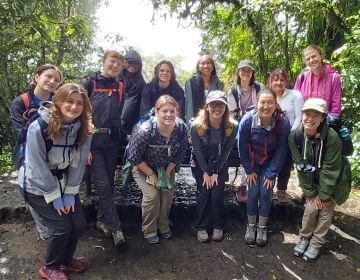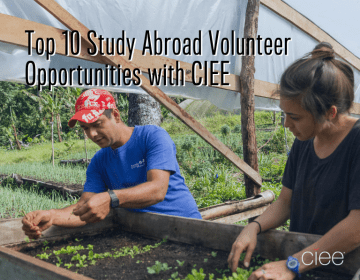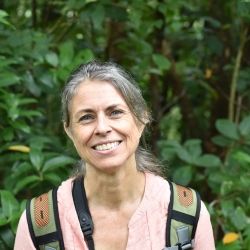Repurposing Organic Waste in the Monteverde Community, by Aaron Spencer (CIEE Intern, University of Colorado-Boulder)
When implementing strategies that promote sustainability, the concept of recycle and reuse is bound to play an important role in pursuing this goal. Building a community that fosters sustainability starts with the idea that we can make use of items that we would otherwise throw away. In the case of Monteverde, where the net waste stream has exploded due to its recent increase in tourism, efforts have been employed to better manage its waste so that it can move towards being a community that is environmentally conscious and ethically aware. I was lucky enough to be able to take on this challenge with the goal to connect farmers and restaurant owners in a way that would incentivize the collection of organic waste that is being produced in the service industry so that local farms could reuse it for plant fertilizer and pig feed on their farm. Conducting interviews, and doing research regarding this practice was essential for completing this task as it is something that requires many considerations before implementing.
Interviewing local farmers.When learning about this internship it immediately stuck out to me as I wanted to be apart of a project that would make a significant difference in the community in addition to gaining professional experience. Sustainability is something that has interested me for awhile now and I am glad that I could experience first hand what it is like to promote it in a beautiful community like Monteverde. I was able to acquire important skills such as how to properly conduct an interview with community members that spoke a completely different language. Analyzing and presenting these findings proved to be just as rewarding as I found that their were many more aspects to consider about this practice than I had initially thought. I also learned more about farms and farm activities as I was given the opportunity to visit many farms in the area and learn about the sustainable practices that take place on them. This gave me a sense of what farming practices worked well and what future practices could be implemented to promote more environmentally friendly activities.
Coordinating efforts with the Municipality.My greatest contributions to this internship include my success in obtaining relevant information that could be applied to the future implementation of this practice. I was able to discover instances where the collection and reuse of organic waste was already something that was being practiced with great success. Discovering these success stories was important in drawing conclusions about what worked and what didn't so that I could apply it to a more broad system of collection and redistribution. After conducting my interviews I created an informative powerpoint that I presented to different stakeholders of this practice. I ended the presentation by leading a discussion with the community members about how this practice could be best executed and what concerns or considerations needed to be taken into account. I was also required to produce an educational brochure that listed things that could and couldn’t be composted or fed to pigs. Everything that I was able to achieve and produce was as rewarding as I had imagined it to be and I am very excited to see how this project plays out.
Sharing results and ideas in a workshop.
Related Posts

Happy Earth Day: Today and Every Day
Happy Earth Day! Every April 22, this global event comes around to remind us how precious our planet is, what sustainable efforts we can make to protect Earth, and that... keep reading

Costa Rica vs. Argentina: Which is Better for Study Abroad?
Imagine yourself sipping mate in a bustling Buenos Aires café or lounging peacefully in a hammock overlooking Costa Rica's lush rainforests. These contrasting scenes represent just a glimpse of the... keep reading

Top 10 Study Abroad Volunteer Opportunities with CIEE
Have you ever wondered if you could volunteer abroad? Perhaps you're looking into study abroad programs that provide international volunteer opportunities. If you’re itching to study abroad and truly make... keep reading
